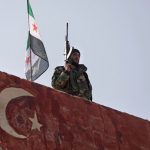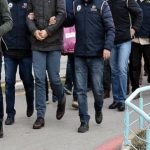A funeral procession was held on 11 November for Bego Polat, one of the witnesses and victims of 1937-38 Dersim Massacre, who died at the age of 96 in Turkey’s Kurdish-majority province of Dersim (officially Tunceli).
Some of his eyewitness accounts were more recently published in May by Duvar. He was quoted saying: “Not a single person was left alive in Dersim. They killed even children. They stabbed children with bayonets and hurled them into the river. They carved babies out of women’s bellies with bayonets. The soldiers said, ‘They will be our enemies tomorrow,’ and they burned everyone.”
The procession was attended by a group of people including Bego Polat’s daughter Rose, his nephew and Alican Onlu, Dersim deputy for the Peoples’ Democratic Party (HDP).
Rose Polat Agum gave a eulogy, saying that his father actually died twice, first in 1938, then now. “We are today bidding farewell to the maimed children of Dersim,” she said.
Noting that Bego Polat lived in sorrow all through his life, deputy Onlu said:
“Uncle Bego didn’t abandon his lands despite his sorrowful life (…) We are currently still faced with attacks against Dersim’s language, culture and faith.”
Nephew Ercan Gur said that in the days of his childhood Bego Polat continued to question why the state killed them. “The state will one day be held accountable for the massacre it conducted in Dersim,” he added.
About Bego Polat
Bego Polat was born to a family of six children in the village of Korkez near the town center of Dersim, and became a witness of the massacre when he was only nine. He saw his mother Humar, and his siblings Elif, Bira and Hatice being killed by Turkish troops. Presumed dead, he was dumped to the river with the lifeless bodies of his mother and siblings, and eventually survived. He was taken by villagers to his brothers in the mountains, where he lived till an amnesty was declared.
His eyewitness accounts were collected by Rose Polat Agum in a book titled “Bego – Dersim 1938 and Aftermath,” with editorial contributions by writer Emirali Yagan.
About Dersim Massacre
A military campaign was launched by the Turkish military in Dersim, in response to an alleged Alevi-Kurdish uprising. The campaign swiftly turned into a massacre of civilians, and over 13,000 people according to official figures, and 30,000 to 70,000 according to different estimates, were killed by Turkish troops. Thousands of people were forced out of their hometowns into migration.
On 23 November 2011, Turkish prime minister Recep Tayyip Erdogan publicly apologized for the Dersim Massacre, describing it as “one of the most tragic events of our near history.”
The Republican People’s Party (CHP), who was the ruling party at the time, has not yet recognized it as a massacre, and neither have the CHP officials given an apology publicly.
Source:gerceknews



